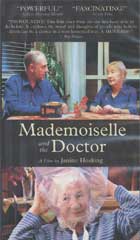
Mademoiselle and the Doctor 2003
Distributed by First Run/Icarus Films, 32 Court St., 21st Floor, Brooklyn, NY 11201; 800-876-1710
Produced by Janine Hosking, iKandy Film Productions
Directed by Janine Hosking
VHS, color, 55 min.
Jr. High - Adult
Death and Dying
Date Entered: 12/09/2005
Reviewed by Warren Hawkes, Library, New York State Nurses AssociationRecent events such as the Terri Schiavo case have brought the discussions of death and dying and the right to die into the public’s awareness again. This documentary focuses on the work of Dr. Philip Nitschke, an Australian physician who is credited with being the first physician in the world to practice voluntary euthanasia, and Mademoiselle Lisette Nigot, a woman who has decided that it is time to end her life. The unusual part of the film is that Nigot is not suffering or debilitated by any disease or disorder. She has simply decided that as she turns eighty, she will end her life before her health deteriorates or she looses the ability to make decisions on her own behalf. The film contains a significant amount of background on the work of Dr. Nitschke, including the development of his medical device created for patients to self administer a lethal injection and his presentations to a wide variety of groups, as well as, his ‘Exit’ workshops. With the 1997 change in Australian law that makes providing assistance with voluntary euthanasia punishable by prison sentences ranging from 14 years to life, Dr. Nitschke has changed the manner in which he distributes information, but he still maintains the passion of his cause. Although Nitschke and Nigot serve as the focus of the film, there is considerable footage of individuals who tell their personal stories of why they are seeking the guidance of Dr. Nitschke. Even though the film is pro-right to die, it succeeds in providing many insightful instances where one will stop and ponder about our rights as individuals verses society’s right to make choices on our behalf. In the end Nigot succeeds in taking her life resulting in enormous public outcry. The film ends with Dr. Nitschke becoming very introspective and stating that perhaps because we spend so much of our lives trying to survive and live that we can not understand the perspective of the individual who believes there is a time to die.
Awards
- Silver Sterling Award, Silverdocs Festival, 2004